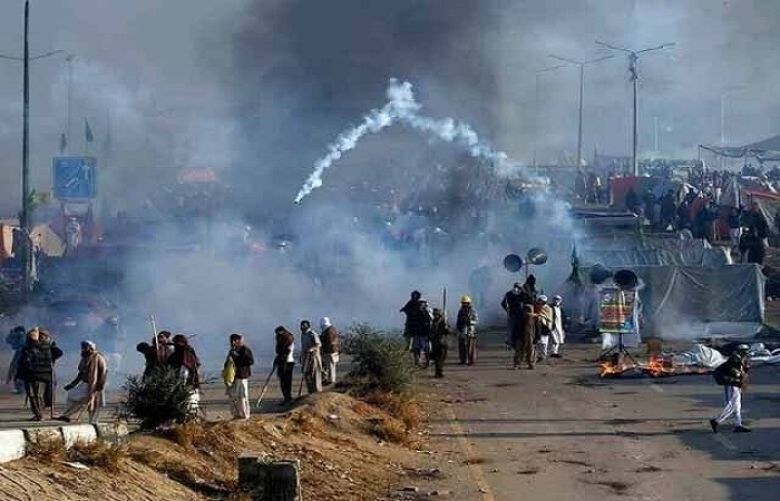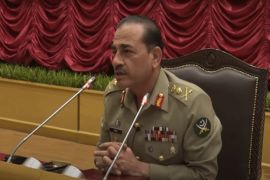The federal government on Friday informed the Supreme Court that it has formed a “special fact-finding committee” to ensure compliance with the top court’s verdict on the 2017 sit-in by the Tehreek-i-Labbaik Pakistan (TLP) at Islamabad’s Faizabad.
Attorney-General for Pakistan Mansoor Usman Awan conveyed this development through a three-page report submitted to the court.
A three-member bench — including Chief Justice of Pakistan Qazi Faez Isa, Justice Aminuddin Khan and Justice Athar Minallah — had on Sep 28 heard a set of review petitions challenging the apex court’s verdict.
However, during the hearing, the defence ministry through the federal government, the PTI and Ijazul Haq — son of former military dictator Ziaul Haq — had joined the Intelligence Bureau and the Pakistan Electronic Media Regulatory Authority (Pemra) to withdraw their pleas, prompting the CJP to ask “why is everyone so afraid to speak the truth”.
Subsequently, the top court had adjourned the hearing till November 1 and directed the respondents’ counsels to submit a written response by October 27.
Authored by Justice Qazi Faez Isa years before he took oath as the CJP, the searing judgement had instructed the defence ministry and the tri-services chiefs to penalise personnel under their command who were found to have violated their oath.
It had also directed the federal government to monitor those advocating hate, extremism and terrorism and prosecute them in accordance with the law.
Adverse observations were also made against several government departments for causing inconvenience to the public as the 20-day sit-in paralysed life in both Islamabad and Rawalpindi.
Pleas were subsequently moved against the verdict by the Ministry of Defence, the IB, the PTI, Pemra, the Election Commission of Pakistan (ECP), the Muttahida Qaumi Movement (MQM), Rashid and Ijazul Haq.
In the latest development today, the AGP submitted a report informing the court that the government has established a fact-finding committee “to ensure directions contained in Feb 6, 2017 judgment”.
He said the three-member committee consisted of the Inter-Services Intelligence (ISI) director and additional secretaries from the ministries of Defence and Interior.
According to the government, the committee has been entrusted with the responsibility of conducting an inquiry and determining accountability as outlined in the terms of reference (TORs).
The TORs encompass the collection, examination, and review of all pertinent documents, records, and evidence. The committee is also mandated to record statements from relevant witnesses, assess the situation in compliance with applicable laws, regulations, and policies, and identify the roles played by all individuals involved in the handling of the matter.
The committee is also tasked with submitting a comprehensive report, inclusive of recommendations.
The report further mentioned that the committee convened its inaugural meeting on October 26 in accordance with the TORs.
“The committee shall furnish a fact-finding report to the Ministry of Defence by Nov 1. In the event, further time is required for furnishing of the report, the committee will seek extension from the Ministry of Defence,” the report added.
It also requested: “The instant application may be granted and the petitioner upon completion of the fact-finding report be permitted, to submit the same before this court.”
Faizabad sit-in
Daily life in Islamabad was disrupted for 20 days (from Oct 2 to Nov 27, 2017) when protesters belonging to religiopolitical parties occupied the Faizabad Interchange which connects Rawalpindi and Islamabad through the Islamabad Expressway and Murree Road, both of which are the busiest roads in the twin cities.
The agitators claimed that during the passage of the Elections Act 2017, the Khatm-i-Nabuwwat oath was deliberately modified as part of a larger conspiracy. The amendment to the oath was deemed a “clerical error” by the government and was subsequently rectified through an act of Parliament.
The government had attempted to negotiate in vain with the protesters to end the sit-in several times. Finally, it launched an operation to disperse the protesters, in which at least six people were killed and scores others injured. After the botched operation, the government decided to call in the army for help.
Negotiations were undertaken with protesters once again, and the government accepted a number of their demands in return for ending the protest. The agreement document bears the signatures of then interior minister Ahsan Iqbal, TLP chief Khadim Hussain Rizvi, and Gen Faiz Hameed, who was a major general at the time, among others.







